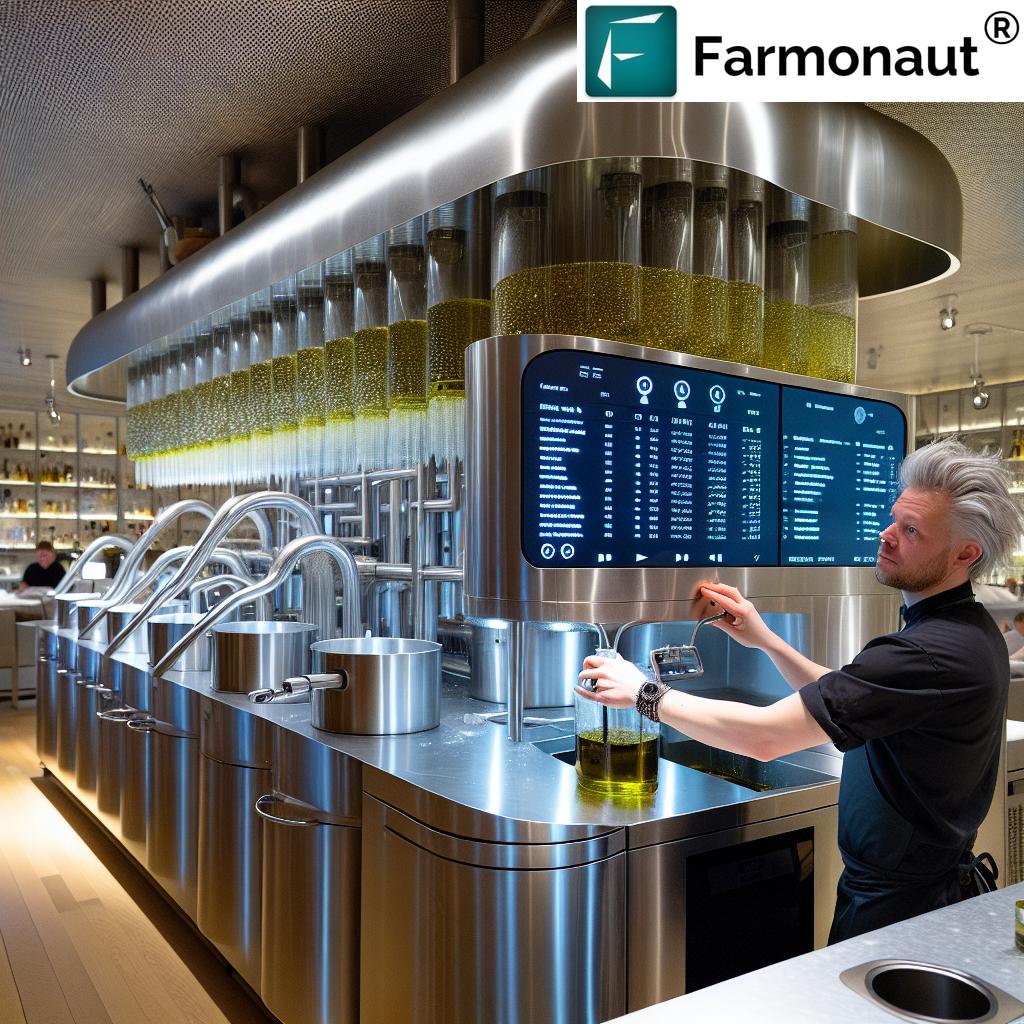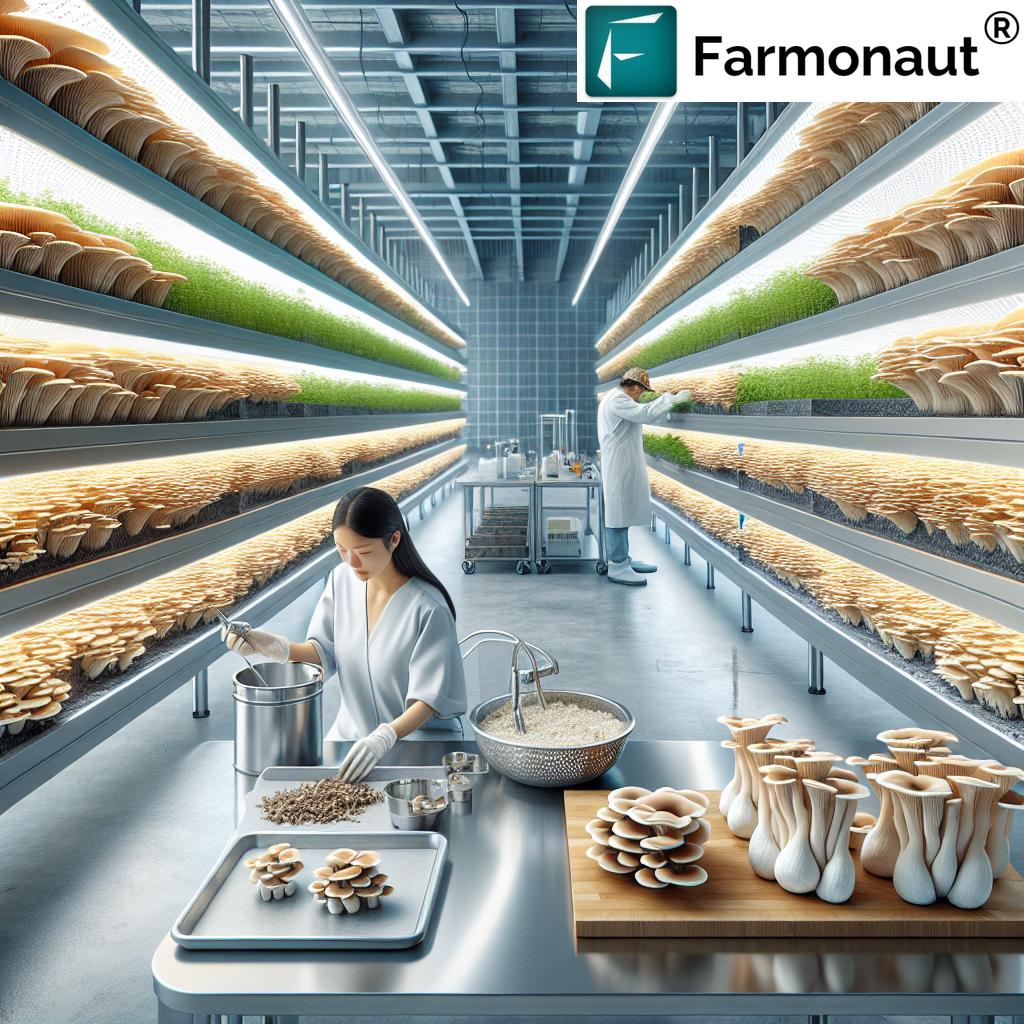Revolutionizing Swedish Restaurants: Innovative Oil Filtration Technology Boosts Sustainability and Food Quality by 2025
“By 2025, Swedish non-chain restaurants could reduce cooking oil waste by up to 50% through innovative filtration technology.”
In the ever-evolving landscape of the food service industry, we are witnessing a remarkable transformation that promises to revolutionize how Swedish restaurants operate, enhance food quality, and contribute to a more sustainable future. As we delve into this exciting development, we’ll explore how innovative oil filtration technology is set to reshape the culinary sector in Sweden by 2025, addressing critical health risks and promoting eco-friendly practices.
The Dawn of a New Era in Restaurant Sustainability
The year 2025 marks a pivotal moment for the Swedish restaurant industry, particularly for non-chain establishments and smaller local chains. A groundbreaking distribution agreement between Beyond Oil Ltd., a food-tech innovation company, and Click Lab AB in Sweden has set the stage for a significant leap forward in sustainable food technology. This partnership, effective from January 24, 2025, aims to introduce patented oil filtration products specifically designed for restaurants that have yet to adopt oil filtration machines.
At the heart of this initiative lies a commitment to enhancing cooking oil longevity, boosting food quality, and minimizing waste – key priorities in the industry’s shift towards more sustainable practices. As we navigate through this blog post, we’ll uncover the multifaceted benefits of this innovative approach and its potential to transform restaurant operations across Sweden.

Understanding the Importance of Oil Filtration in Restaurants
Before we delve deeper into the specifics of this revolutionary technology, it’s crucial to understand why oil filtration is so important in the restaurant industry. Cooking oil is a fundamental component in many culinary traditions, especially in frying processes. However, the repeated use of frying oil poses significant health risks and environmental concerns.
- Health Risks: Reused frying oil can lead to the formation of harmful compounds linked to cancer and cardiovascular diseases.
- Environmental Impact: Improper disposal of used cooking oil can cause severe environmental damage, polluting water sources and harming wildlife.
- Operational Costs: Frequent oil changes increase operational expenses for restaurants, impacting their bottom line.
The introduction of advanced oil filtration technology addresses these issues head-on, offering a solution that benefits both restaurants and consumers alike.
The Revolutionary Oil Filtration Technology
Beyond Oil Ltd.’s patented oil filtration products represent a leap forward in sustainable food technology. With over 15 years of research and development, these products are designed to counteract the health risks associated with reused frying oil while simultaneously improving efficiency for food service operators.
“Advanced oil filtration in Swedish restaurants may extend cooking oil life by 2-3 times, significantly reducing operational costs.”
Key features of this innovative technology include:
- Extended Oil Life: The filtration process can significantly extend the usable life of cooking oil, reducing the frequency of oil changes.
- Improved Food Quality: By maintaining oil quality, the technology ensures that fried foods retain their intended taste and texture.
- Reduced Waste: Less frequent oil changes mean less oil waste, contributing to environmental sustainability.
- Cost-Efficiency: Restaurants can see a substantial reduction in operational costs related to oil purchase and disposal.
This technology has gained regulatory approval from bodies like the FDA and Health Canada, underscoring its safety and effectiveness in addressing the common industry practice of reusing frying oil multiple times.
Impact on Swedish Restaurants and the Culinary Sector
The introduction of this oil filtration technology in Sweden is expected to have a profound impact on the local restaurant industry. Let’s explore the anticipated benefits:
- Enhanced Food Safety: By maintaining oil quality, restaurants can significantly reduce the health risks associated with degraded cooking oil.
- Improved Sustainability: Reduced oil waste aligns with Sweden’s strong environmental values and sustainability goals.
- Economic Benefits: Lower operational costs can help improve profitability, especially for smaller, non-chain restaurants.
- Competitive Advantage: Restaurants adopting this technology can market themselves as health-conscious and environmentally responsible.
To better illustrate the potential impact, let’s look at a comparative analysis:
| Metrics | Before Implementation | After Implementation (Estimated 2025) |
|---|---|---|
| Average Oil Longevity (Days) | 3-5 | 9-15 |
| Food Quality Rating (1-10) | 7 | 9 |
| Monthly Oil Waste (Liters) | 200 | 80 |
| Operational Costs (SEK) | 50,000 | 35,000 |
| Food Safety Compliance (%) | 85 | 98 |
| Environmental Impact Score (1-100) | 60 | 85 |
This table clearly demonstrates the significant improvements across various metrics, highlighting the transformative potential of this technology in the Swedish restaurant industry.
The Role of Click Lab AB in Distribution
The success of this initiative greatly depends on effective distribution and implementation. Click Lab AB, with its established distribution networks and expertise in the Swedish market, plays a crucial role in ensuring that this technology reaches its intended audience.
Gal Sakoury, Co-Founder of Click Lab AB, emphasizes the company’s strategy of seeking out innovative products that create substantial impact. By partnering with Beyond Oil Ltd., Click Lab AB is not just distributing a product; they’re championing a movement towards better food quality and reduced environmental impact in Sweden’s restaurant sector.
Global Implications and Future Prospects
While our focus is on the Swedish market, it’s important to note that this development has global implications. The success of this initiative in Sweden could serve as a model for other countries looking to improve sustainability and food quality in their restaurant industries.
As we look towards the future, we can anticipate:
- Further technological advancements in food service sustainability
- Increased consumer awareness and demand for healthier, more sustainable dining options
- Potential regulatory changes favoring sustainable practices in the food service industry
- Expansion of similar technologies to other sectors of the food industry
Challenges and Considerations
While the benefits of this innovative oil filtration technology are clear, it’s important to address potential challenges in its implementation:
- Initial Investment: Restaurants may need to consider the upfront cost of adopting new technology.
- Training and Education: Staff will need proper training to effectively use and maintain the filtration systems.
- Consumer Perception: Educating consumers about the benefits of this technology may be necessary to build trust and appreciation.
- Regulatory Compliance: Ensuring ongoing compliance with food safety regulations as they evolve.
Addressing these challenges will be crucial for the widespread adoption and success of this technology in the Swedish restaurant industry.
The Broader Context of Sustainable Food Technology
The introduction of innovative oil filtration technology in Swedish restaurants is part of a larger trend towards sustainable food technology. This movement encompasses various aspects of the food industry, from production to consumption, aiming to create a more sustainable and healthier food system.
Other areas of innovation in sustainable food technology include:
- Precision agriculture for more efficient crop production
- Plant-based and alternative protein sources
- Food waste reduction technologies
- Sustainable packaging solutions
These advancements collectively contribute to a more sustainable and resilient food industry, addressing global challenges such as climate change, food security, and public health.
Consumer Impact and Health Benefits
The implementation of advanced oil filtration technology in Swedish restaurants is not just a win for sustainability and operational efficiency; it also brings significant health benefits to consumers. By ensuring that cooking oil is maintained at optimal quality, this technology helps to:
- Reduce the intake of harmful compounds formed in degraded oil
- Maintain the nutritional quality of fried foods
- Enhance the overall taste and texture of dishes
- Potentially lower the calorie content of fried foods due to less oil absorption
These health benefits align with growing consumer awareness and demand for healthier dining options, potentially driving increased patronage to restaurants adopting this technology.
Environmental Impact and Sustainability
The environmental benefits of this oil filtration technology extend beyond just reducing oil waste. Let’s explore the broader environmental impact:
- Reduced Carbon Footprint: Less frequent oil changes mean fewer transportation requirements for oil delivery and waste collection.
- Water Conservation: Improved oil quality can lead to less frequent cleaning of fryers, potentially saving water.
- Biodiversity Protection: Proper oil management reduces the risk of environmental contamination that can harm local ecosystems.
- Energy Efficiency: Well-maintained oil requires less energy to heat, potentially reducing overall energy consumption in kitchens.
These environmental benefits contribute to Sweden’s broader sustainability goals and position the restaurant industry as a leader in eco-friendly practices.
Economic Implications for the Swedish Restaurant Industry
The adoption of innovative oil filtration technology is poised to have significant economic implications for the Swedish restaurant industry:
- Cost Savings: Reduced oil consumption and waste disposal costs can lead to substantial savings, especially for smaller restaurants operating on tight margins.
- Increased Profitability: Lower operational costs can translate to improved profitability or allow restaurants to invest in other areas of their business.
- Job Creation: The distribution, installation, and maintenance of these new systems could create new job opportunities in the sector.
- Innovation Stimulus: Success in this area may encourage further investment and innovation in sustainable restaurant technologies.
These economic benefits could help strengthen the resilience of the Swedish restaurant industry, particularly in the face of challenges such as rising food costs and changing consumer preferences.
The Role of Technology in Modern Restaurants
The introduction of advanced oil filtration systems is just one example of how technology is transforming the restaurant industry. In today’s digital age, restaurants are increasingly relying on various technologies to enhance operations, improve customer experience, and stay competitive. Some key areas include:
- Point of Sale (POS) Systems: Advanced POS systems streamline ordering and payment processes.
- Inventory Management Software: These tools help restaurants optimize their stock levels and reduce waste.
- Online Ordering and Delivery Platforms: Digital platforms expand restaurant reach and offer convenience to customers.
- Customer Relationship Management (CRM) Systems: CRM tools help restaurants personalize customer experiences and build loyalty.
The oil filtration technology fits seamlessly into this technological ecosystem, further modernizing restaurant operations and aligning with the industry’s digital transformation.
Future Trends and Innovations
As we look beyond 2025, the success of oil filtration technology in Swedish restaurants could pave the way for further innovations in sustainable food service. Some potential future trends include:
- AI-Powered Kitchen Management: Artificial intelligence could optimize cooking processes, including oil usage and filtration.
- Smart Fryers: Next-generation fryers might incorporate built-in filtration systems and real-time oil quality monitoring.
- Biodegradable Cooking Oils: Development of more environmentally friendly cooking oils that break down faster when disposed of.
- Waste-to-Energy Systems: Technologies that convert used cooking oil into biofuel for restaurant operations.
These potential innovations highlight the ongoing evolution of the restaurant industry towards more sustainable and efficient practices.
The Global Context: Sweden as a Leader in Sustainable Practices
Sweden’s adoption of innovative oil filtration technology in its restaurant industry is not an isolated event. It’s part of the country’s broader commitment to sustainability and environmental stewardship. Sweden has long been recognized as a global leader in sustainable practices, and this initiative further cements that reputation. Some key points to consider:
- Climate Goals: Sweden aims to become carbon neutral by 2045, and initiatives like this in the food service industry contribute to that goal.
- Circular Economy: The oil filtration technology aligns with Sweden’s push towards a circular economy, where resources are used efficiently and waste is minimized.
- Innovation Hub: This development showcases Sweden’s role as a hub for sustainability innovation, potentially attracting more green technology companies.
- Global Influence: Success in Sweden could inspire similar initiatives in other countries, amplifying the global impact.
By leading the way in sustainable restaurant practices, Sweden is setting an example for the global food service industry.
The Role of Consumer Awareness and Education
The success of this innovative oil filtration technology in Swedish restaurants will partly depend on consumer awareness and appreciation. As restaurants adopt these new practices, it’s crucial to educate consumers about the benefits:
- Health Benefits: Inform diners about the reduced health risks associated with properly filtered cooking oil.
- Environmental Impact: Highlight how choosing restaurants with this technology contributes to environmental conservation.
- Food Quality: Explain how maintained oil quality enhances the taste and texture of fried foods.
- Sustainability Efforts: Showcase how supporting these restaurants aligns with broader sustainability goals.
Restaurants can use various channels to educate consumers, including menu descriptions, social media campaigns, and in-house displays explaining the technology and its benefits.
Regulatory Framework and Government Support
The successful implementation of oil filtration technology in Swedish restaurants will likely require a supportive regulatory environment. Here’s how regulations and government support could play a role:
- Safety Standards: Establishment of clear safety standards for oil filtration technology in food service.
- Incentives: Potential tax incentives or grants for restaurants adopting sustainable technologies.
- Waste Management Regulations: Stricter regulations on cooking oil disposal could encourage adoption of filtration systems.
- Public-Private Partnerships: Collaboration between government agencies and the private sector to promote and implement sustainable restaurant practices.
Government support can significantly accelerate the adoption of this technology, making it more accessible to a wider range of restaurants across Sweden.
FAQs about Oil Filtration Technology in Swedish Restaurants
- Q: How does oil filtration technology improve food quality?
A: Oil filtration removes impurities and maintains oil quality, resulting in better-tasting fried foods with improved texture and less oil absorption. - Q: Will this technology increase the cost of meals at restaurants?
A: While there may be an initial investment for restaurants, the long-term cost savings from reduced oil usage and waste should not significantly impact meal prices. - Q: Is filtered oil as safe as fresh oil?
A: Properly filtered oil can be as safe as fresh oil, as the filtration process removes harmful compounds that form during frying. - Q: How often does the oil need to be changed with this new technology?
A: The frequency of oil changes can be reduced by 2-3 times, depending on usage and the specific filtration system employed. - Q: Can this technology be retrofitted to existing fryers?
A: Many oil filtration systems are designed to be compatible with existing fryers, making adoption easier for restaurants.
Conclusion: A Bright Future for Swedish Restaurants
As we look towards 2025 and beyond, the introduction of innovative oil filtration technology in Swedish restaurants marks a significant milestone in the journey towards more sustainable and health-conscious food service practices. This development not only addresses critical health risks associated with reused frying oil but also aligns perfectly with Sweden’s commitment to environmental stewardship and innovation.
The benefits of this technology are far-reaching:
- Enhanced food quality and safety for consumers
- Reduced environmental impact through minimized oil waste
- Improved operational efficiency and cost savings for restaurants
- Alignment with broader sustainability goals and consumer values
As this technology becomes more widespread, we can expect to see a transformation in how Swedish restaurants operate, setting a new standard for the global food service industry. The collaboration between Beyond Oil Ltd. and Click Lab AB serves as a model for how innovative partnerships can drive positive change in the culinary sector.
The future of Swedish restaurants looks bright, with this oil filtration technology paving the way for a more sustainable, efficient, and health-conscious dining experience. As consumers, industry professionals, and policymakers, we all have a role to play in supporting and promoting these advancements, ensuring a better future for our food industry and our planet.
By embracing this innovative technology, Swedish restaurants are not just filtering oil; they’re filtering out outdated practices and ushering in a new era of sustainable food service. The revolution in Swedish restaurants is underway, and its impact will be felt far beyond the kitchen.













